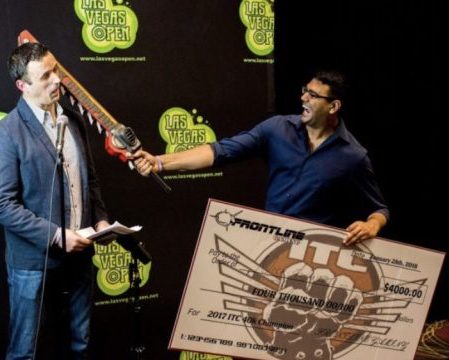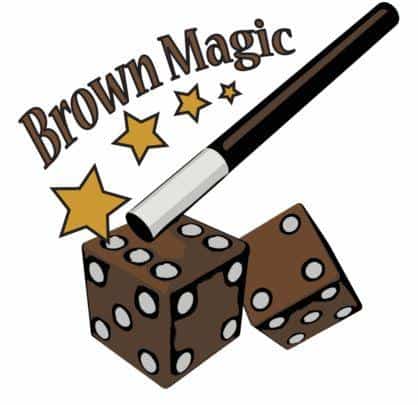Want to play better? From competitive to casual play, today we’re showcasing two easy ways to play better games of 40k that are as solid as they come.
Matt Root from the Brown Magic has a few strategies you can use in tournaments, and casual games alike to increase your success.
Up until now, we’ve focused on pre-tournament strategies, but it’s time to dial in on a few aspects that occur during the tournament. There are two particular areas I want to talk about today: bravery in combat and winning with pessimism.
1: Bravery in Combat
Warhammer 40k, at its core, is a social contract. When you walk up to the table to shake your opponent’s hand, you are stating the following:
- I am here to play a game of Warhammer 40k at some number of points using specific missions.
- I agree to follow the rules.
- I agree to communicate my intentions clearly.
Without this unspoken agreement, the game falls apart. You cannot take an Age of Sigmar army to a Warhammer 40k tournament with 4000 points instead of 2000, make up special rules as you go, and roll dice without telling your opponent what you are doing.
Sadly, in the competitive scene, Warhammer 40k attracts all types of competitors, even those who will do anything, including cheating, to win.
Warhammer 40k, like all other competitions on the planet, has its fair share of cheaters. They are rare, but they exist, and they do play in tournaments all across the world. Chances are you may have played against one. However, the cheating I’m speaking of is rarely so obvious as drilled dice or an illegal list. Instead, this kind of cheating is in breaking the social contract.
How many times have you played someone where you felt like either:
- A person was making up rules or, at the very least, misleading you about what certain units did or
- Rolled dice without telling you what for, and then before you can see the dice, telling you that you owe them X number of armor saves – way above the average.
These are two examples which break the social contract: following the rules and communicating clearly. These are often grey areas: did your opponent honestly think the Autocannon was strength 8, when it was, in fact, strength 7, or was he trying to get an advantage?
Did that opponent move too far with his unit by accident because he was in a hurry, or is he hoping you won’t notice? Did he accidentally roll 16 shots with his flyrant because he was tired and wasn’t thinking straight, or does he think you don’t know that it’s actually 12 shots?
Rarely, if ever, is cheating obvious, and 99% of the time, it’s an honest mistake. However, that 1% can and absolutely will happen to you, and how you respond to it is important.
This is what I mean by Bravery in Combat: you need to be willing to stand up for yourself in a game of Warhammer 40k.
If you think your opponent is misquoting the rules, you need to ask to see the codex. If you think your opponent is measuring too far for units, you need to be willing to double check the actual movement yourself. If you think that a person is rolling too many dice, you need to tell them to slow down so that you can see what they are doing, and if necessary, correct them. You need to be willing to tell your opponent to stop, and if necessary, get a judge.
This doesn’t mean you’re a jerk. There are polite ways to do this. If I think my opponent is misplaying something, rather than bothering them about it, I look it up in my own book and then, if necessary, correct them. If I feel the need to request a judge, I will ask my opponent to try and play a little cleaner before telling them I feel uncomfortable with the situation and that I would like a professional ruling. You need to be willing to do the same.
Let’s use an example.
Let’s say your opponent has been rolling dice too quickly for you to see throughout the game, despite you asking for them to slow down. It’s been an extremely close game so far, and now it’s down to the wire. At the end of the game, he needs to make a 10” charge on one of your units. If he succeeds, he wins. If he fails, you win instead.
Your opponent then rolls the charge dice behind a piece of terrain where you can’t see them, and before you can look for yourself, he quickly picks up the dice and says he rolled a 10”.
How do you respond?
Option A: You accept that the opponent rolled a 10” and let him make the charge.
Option B: You politely contest the charge, saying that because he rolled it behind the terrain where you can’t see it and picked up the dice, that you cannot verify he did so.
Option C: You refuse to accept that he rolled a 10”, call him a cheater, and tell him that he’s been cheating you the whole game and that he only rolled it behind terrain so you wouldn’t see it.
Option A is the passive response. It is polite, but it will cost you the game because you were not willing to stand up for yourself. This is often the option that 40k players pick because 40k is a social game and in a perfect world, no one would lie to you.
Option C is the jerk response. It is inappropriate, rude, and makes many assumptions. It solves nothing and only invites further arguments and tempers.
Option B is standing up for yourself. You are asserting a valid complaint: you have asked your opponent to roll slower multiple times, and on a pivotal roll, he rolled in a place you cannot see without letting you see the result. You are not accusing your opponent of cheating, but you are telling them that without any way to verify the result that it would not be fair to accept the roll.
99% of the time, Option A is fine. You are playing an opponent you trust, who has been friendly, who hasn’t given you any reason to doubt them. It’s perfectly acceptable to let them have the 10” charge.
However, if you feel like the situation is unjustified, you need to tell your opponent, and if necessary, call a judge to rectify the situation. It’s not your fault that the opponent didn’t follow social protocol in letting you see the dice. It will be your fault if you let it slide and then complain about the loss to your friends afterward without having done anything about it.
It’s a sad fact in Warhammer 40k that there are competitive, skilled Warhammer 40k players who will try to take advantage of this situation. These are infamous players that many know, but proving that someone is actually cheating you is nearly impossible, which is why if you feel like the social contract is being broken, you need to stand up for yourself. You need to be brave in combat.
Remember that standing up for yourself doesn’t make you a jerk, it just means you are assertive enough to try and prevent people from taking advantage of you. You don’t have to be a dick to be successful in Warhammer 40k, but you do need to be willing to enforce the social contract when necessary on your own behalf.
Otherwise, people can, and will, take advantage of that.
2 Winning with Pessimism
It’s my opinion that optimism is a giant trap in competitive 40k. I don’t mean optimism about winning the game or optimism that you will do well in general (also good), but rather, optimism about your army’s actions and the results you expect to see.
How many times have you shot a unit and said, “Man, that thing should be dead”? That’s the kind of optimism I’m talking about. You want to plan for the worst and hope for the best on the tabletop.
Mathematically speaking, it takes about 18 shots from Dark Reapers to kill a single Flyrant. You may know this as you start your turn, and you really need that Flyrant dead or it could really wreck your lines. So, you plan on killing the flyrant by shooting 18 reapers at it. Meanwhile, you drop your guardian blob next to that scary genestealer squad headed your way and smite a carnifex to death.
Unfortunately, the Flyrant lives anyways when your opponent rolls well. Uh oh.
You’ve just suffered from a critical case of optimism. Now your opponent can take advantage of your inability to kill his flyrant and there’s nothing you can do about it. You’ve already executed the other parts of your plan with the assumption that the flyrant would be dead, including smiting the carnifex before starting shooting and dropping the guardians over near the genestealers instead of near the flyrant. Now, your mistake could cost you the game.
Be pessimistic on the tabletop. If you assume your reapers won’t kill the Flyrant, you can adjust accordingly by modifying your screens to slow the flyrant down and by dropping the guardians and smites on him instead.
I can’t tell you how many times I’ve played someone and they split their firepower between my big scary flyrants hoping they would kill 3 or 4 of them, only to find out that they’ve done 4 or 5 wounds to those flyrants instead. If my opponent had been pessimistic and assumed the worst about shooting effectiveness, he would have killed two flyrants rather then ineffectually wounding a couple more.
Do you need to make a charge really badly on that unit on the objective? Be pessimistic and assume you won’t. Maybe you can make up for it by putting a second charging unit in place or by shooting them dead instead.
Do you need to do a single mortal wound to that tank with your smite? Be pessimistic and assume you won’t. Set up a second smite to go off, and save a reroll specifically for that psychic cast.
Do you expect your guardian blob to live through combat with those grotesques? Be pessimistic and assume they won’t. Now, if those Grotesques make it out of combat where are they going to go next? Can you set up a ranger squad to screen them? Can you otherwise slow them down somehow?
Assume nothing in 40k. Any time you can mitigate odds by being pessimistic and assuming the worst, you should be doing so. Winning with pessimism has been a huge key to my success in the past. Embrace the idea of redundancy, of planning for things going wrong, of assuming that your opponent will roll amazingly, and you’ll be amazed at how much difference it makes in your actual gameplay.
Final Conclusions and Finishing Thoughts:
I hope you’ve enjoyed this myriad tour through the twistings and turnings of tips I 100% practice myself.
Best of luck to you in your future tournaments, and remember that if you need me, the List Doctor is Always In! Let me know if you found these articles helpful and what you hope to see from me again in the future!
















